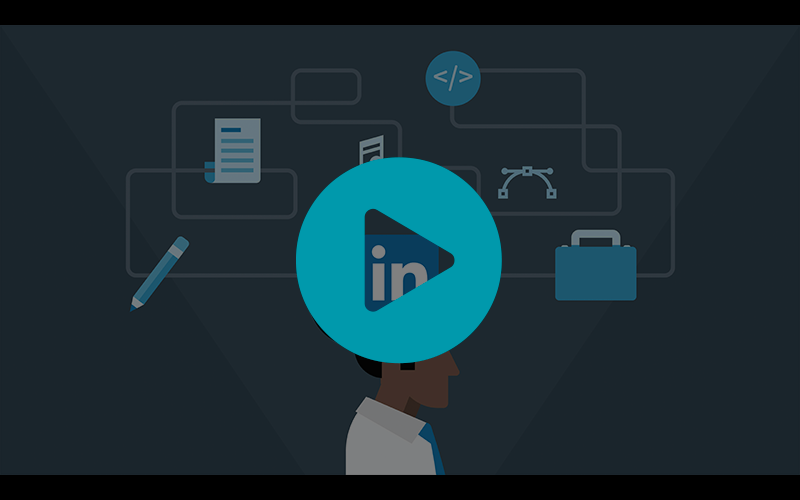IT essentials for new students
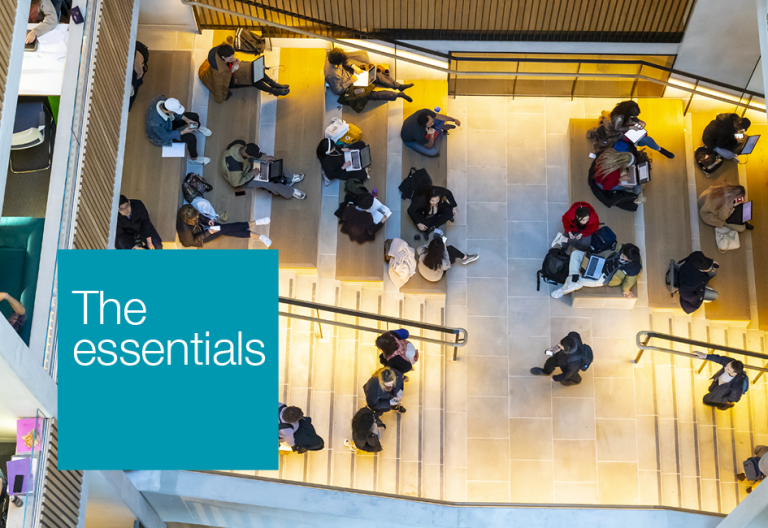
The essentials
Work through our essentials list first. This will get you up and running - and save time later.
- Your UCL user ID
Your user ID is your key to accessing your computer account (such as your email) and other UCL systems and resources.
Your user ID is made up of seven characters. For example: ucaaxxx.
Can I change my user ID?
Your user ID is unique to you and cannot be changed.
Find out more on our User IDs and Passwords page.
- Your UCL password
Along with your user ID, you will also need your UCL password to access UCL systems. You should have set a password yourself, as part of your pre-enrolment.
How to change your password
If you can’t remember your password, or need to change it, go to MyAccount (you're going to need your mobile or your personal email address, so make sure that you have it to hand).
Find out more on our User IDs and Passwords page.
- Connect to Wi-Fi
UCL's Wi-Fi service is called eduroam.
To connect:
1. Go to the Configuration Assistant Tool (CAT).
2. Download the eduroam installer for your device.
2) Use the CAT and follow the on screen instructions to get your device ready for eduroam
If you need further assistance, view our how-to guide on connecting to eduroam.
- Connect to email
The easiest and quickest way to check your email and calendar is via Outlook Web Access (OWA).
What’s my email address?
You have a friendly email alias, usually in a format such as: firstname.surname.20@ucl.ac.uk. An email from postmaster@ucl.ac.uk will be sent to your UCL email with details of your alias. This is what you should use for sending and receiving email. But don’t worry if someone does send an email to your ‘userID@ucl.ac.uk’ address, it will end up in your Inbox too!
Find out more on our Email and Calendar page.
- Connect to printers
UCL's print, copy and scan service is called Print@UCL.
You receive free credit
You receive £12 free credit to get you started. After that you will need to top up online.
How to use the printers
To print from one of the following computer services, simply select the print-ucl queue.
- Desktop@UCL
- Desktop@UCL Anywhere
If you are using your own computer, you will need to add the print queue to your machine.
Find out more on our Getting Started with Print@UCL page.
- Stay secure online
Never give your password to anyone else. Guard it as you would your bank PIN.
UCL will never ask you for your password. Please ignore such requests and report them to the IT Services Desk.
Information Security Awareness course
Do you know your ransomware from your spyware? Your firewall from your phishing? Learn more about how to stay secure online: take our free online security course.
Find out more on our Stay Secure web page.
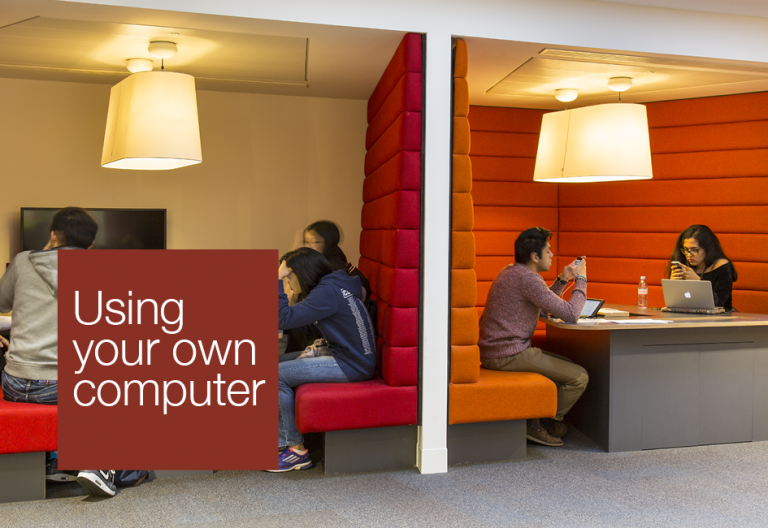
Using your own computer
Find out how to connect to IT services, using your own device.
- Technical requirements for studying at UCL
There are a few standard technical things that we would recommend so you are able to access IT and digital resources at UCL.
It is also important, especially at this time of remote working, to make sure that your workspace is set up in the best possible way.
Find out more on our Technical requirements web page.
- Connect to UCL systems and resources using your own computer
Do you need access to software that you are using on your course? Use Desktop@UCL Anywhere.
This service gives you free access to software and resources that you would normally use in the student computer workrooms and in your lessons. You can use Desktop@UCL Anywhere - anywhere! Whether you’re in a cafe, on campus, or back at home in your Halls. Also, there’s no need to download the software you want to use on your own computer, saving you space.
How to access Desktop@UCL Anywhere
For full features, you will need to install a piece of software called Citrix Workspace on your computer before you can access Desktop@UCL Anywhere.
There is also a ‘light’ version is accessible via a browser, but for the best experience, we recommend that you download Citrix Workspace.
Find out more on our Desktop@UCL Anywhere page.
- Where to save your work/how to access files
You have your own personal storage space on UCL’s file storage service called Filestore@UCL.
Filestore@UCL is the best place for you to save your all-important work. Your personal and secure storage space is called your N: drive and comes with 100GB of space. To add your N: drive your own computer takes two steps:
1. You need to connect to UCL’s Virtual Private Network (VPN).
2. Add (or map) your N: drive to your computer.
What if I need to share files?
You also have access to Microsoft’s OneDrive (part of Office 365). OneDrive is useful if you want to collaborate on documents or to share files too large to send by email. See the 'Access Software' section (below) for details on how to access Office 365 and OneDrive.
Find out more on our Filestore@UCL and Virtual Private Network (VPN) pages.
- Download software
Download teaching and learning software
From UCL’s Software Database, you can download, free of charge, software such as SPSS and Matlab, ArcGIS, on your own computer.
Download free anti-virus software
It is very important that you keep your device secure and up-to-date. To help with this, UCL also provides free anti-virus software from the Software Database.
Office 365
You can also download Office 365 at no cost. Office includes the latest version of Word, Excel, PowerPoint, OneNote, and more. See the 'Access Software' section (below) for more details.
Find out more on our Software for Students page.
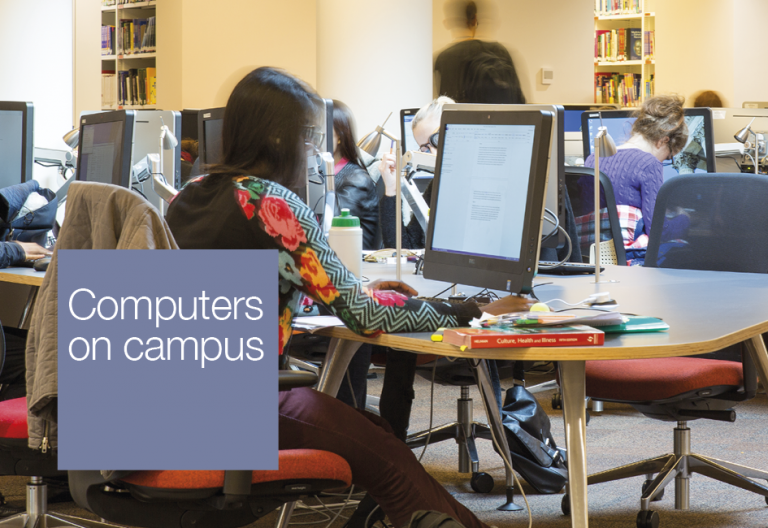
Computers on campus
- Using computers in the workrooms
The computers in the workrooms are called Desktop@UCL.
When using these computers, you should save your work on Filestore@UCL - your N: drive. (Open File Explorer to see your N: drive.)
If you save your work on the N: drive, you’ll be able to access your files when you’re off campus, using a remote service called: Virtual Private Network (VPN). (See the 'Using your own computer' section (above) for more details.)
When you use Desktop@UCL, you have access to a vast range of teaching, learning and research software and resources.
Find our more on our Computers on Campus page.
- Borrow a laptop
Laptop loans is a service that provides you with a short term loan of a laptop, free of charge.
Where to borrow a laptop?
Laptops can be borrowed from some Library sites on a short term basis.
Find out more on our Laptop Loan page.
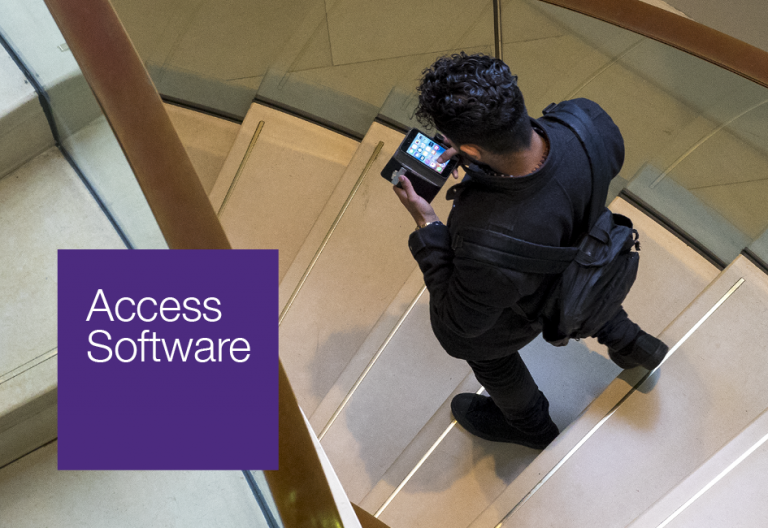
Access software
Find out about the UCL Go! app and how you can access Office 365.
- Download the UCL Go app
One-tap access to your timetable, email, the library and our learning environment (Moodle). Take a virtual tour. Discover what's on and how to get there. Opt-in to notifications about topics you find interesting. Get alerts about things you need to know. Get the most from your time at UCL. Get UCL Go
How to access the UCL Go! app
Download via your mobile app store.
Find out more on our UCL Go! web page
- Access Office 365
Office 365 has a suite of apps that you can use for free. The apps are accessible from your email account (Outlook Web Access). These include:
- Word
- Excel
- PowerPoint etc.
- OneDrive
- Teams (see below)
- OneNote and much more
You can also download these apps on to your own computer and up to five devices.
Find out more on our Office 365 page.
- Access Microsoft Teams
Microsoft Teams is a platform that allows you to have ongoing chat based conversations, video meetings and voice calls. You can also share files, edit documents, manage projects and much more.
Why might I need to use Teams?
Your course supervisor may schedule meetings and calls via Teams. You might also use Teams to work collaboratively with others, on a group project for example.
Find out more on our Microsoft Teams Page.
- Access Zoom Enterprise
Zoom Enterprise is a platform that allows you to host and join video meetings and webinars.
Why might I need to use Zoom Enterprise?
Your lecturer may schedule lectures or seminars using Zoom. You can access these online if you are not on campus.
Find out more on our Zoom support page.
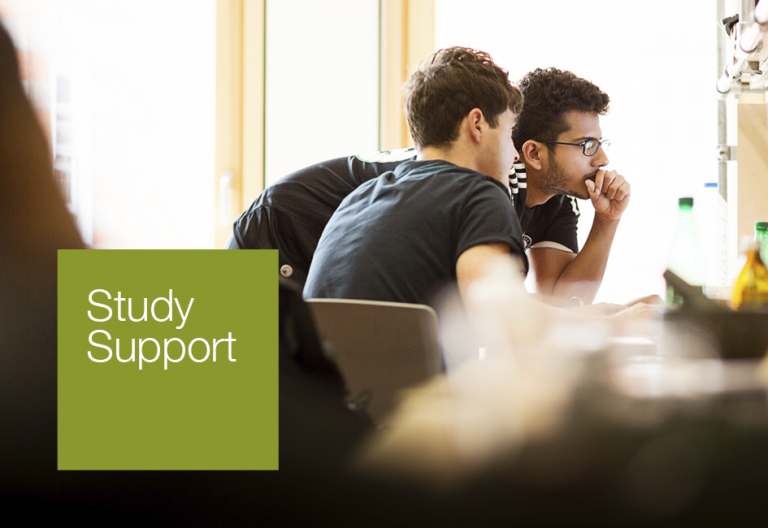
Study support
Learn how you can use IT to support your studies. Develop your IT skills with a vast range of online learning materials.
- Digital Education
To learn more about any of the technologies below sign up to the Digital Education at UCL Moodle course.
Moodle
Moodle provides access to your teaching content, online resources, and activities for all your UCL modules. In some cases, Moodle can be used to complete tasks, watch your lecture content and recordings via Lecturecast and complete assessments.
While the vast majority of teaching will take place on campus, Zoom and Teams may also be used occasionally for online meetings.
Help and Support for Moodle and other digital tools can be found on the Student Wiki pages.- Digital Assessment
To learn more about any of the technologies below, sign up to the Digital Education at UCL Moodle course
AssessmentUCL
AssessmentUCL is a new assessment platform at UCL. You may be asked to submit exams and other assessments on AssessmentUCL. It also uses Turnitin to check your work for plagiarism. Feedback, including provisional grades, can be returned on the same page you submitted from. Final grades are released on the student records platform, Portico.Moodle quiz/exam
A Moodle quiz/exam is an activity carried out on Moodle. It can consist of multiple-choice questions, short answer questions and more. It may be used in both summative (credit-bearing) or formative assessments in your modules to test your subject knowledge and skills.Moodle assignments
Students will often be asked to submit assignments on Moodle. Feedback is commonly returned on Moodle, on the same page you submitted from.Turnitin
Turnitin scans a student’s assignment and compares it against other student assignments and a database of academic papers and websites. It helps students check they have referenced correctly and is used by staff to check for plagiarism.Help and support for Digital Assessment can be found on the Student Wiki pages .
- Digital skills development
IT training
Visit our training pages to view our range of courses and learning materials. We also run a drop-in service for individual help with IT skills.
LinkedIn Learning
A vast library of over 13,000 video tutorials. Courses cover a wide range of topics and can help you with study skills, learning new software, personal development and much more.
Watch a video guide on Gaining Skills with LinkedIn Learning:
Find out more on our Digital Skills Development page.
- DigiLearn Online video library
A library of online videos covering UCL IT essentials. Topics including remote connectivity, data storage essentials, Microsoft Office 365 applications, and much more.
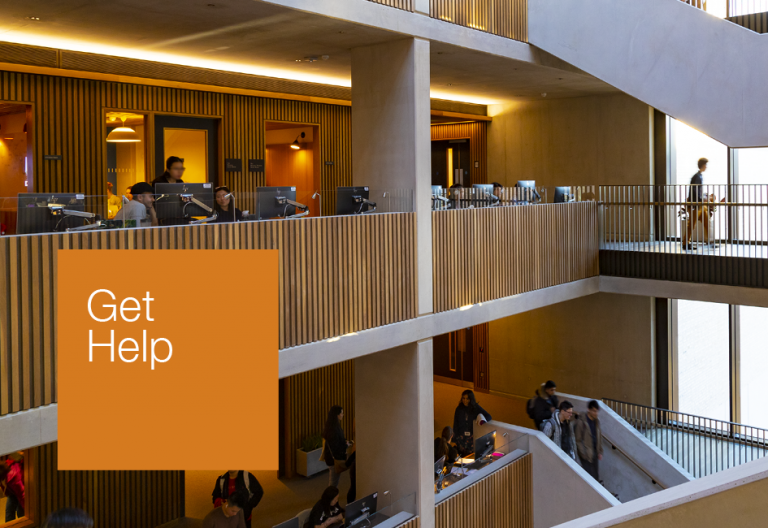
Get help
Need some support? No problem. Find out the different ways to get in touch with us.
Get help
Contact the IT Services Desk
Face-to-face support for IT Services Desk is available at a number of locations. or you can get in contact with us online via chat or email or pick up the phone. View our Help & Support pages.
Try our how-to guides
Search from the help categories or use the search bar to find what you're looking for.
Get help from the Digital Accessibility Hub
The Digital Accessibility Hub is equipped with an up-to-date range of software and technology, designed for students with disabilities. Face-to-face support will be dependant on government guidance and staff availability. See Digital Accessibility Hub page for more information.
 Close
Close


